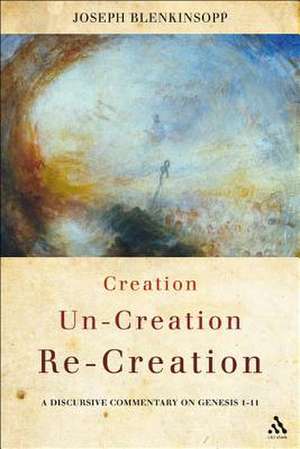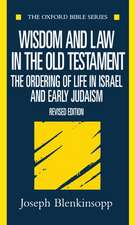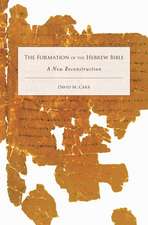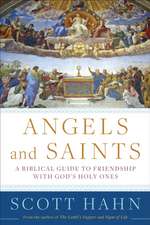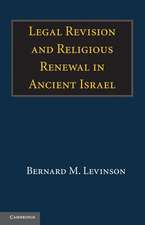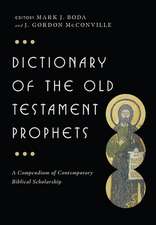Creation, Un-creation, Re-creation: A discursive commentary on Genesis 1-11
Autor Professor Joseph Blenkinsoppen Limba Engleză Hardback – 16 feb 2011
Joseph Blenkinsopp provides a new commentary on Genesis 1-11, the so-called 'Primeval History' in which the account of creation is given.
Blenkinsopp works with the conviction that, from a biblical point of view, creation cannot be restricted to a single event, nor to two versions of an event (as depicted in Genesis 1-3) but, rather, must take in the whole period of creation arranged in the sequence: creation - uncreation - recreation (as can be derived from Genesis 1-11). Through the course of the commentary, presented in continuous discussion rather than in a rigid verse-by-verse form, Blenkinsopp takes into account pre-modern interpretations of the texts, especially in the Jewish interpretative tradition, as well as modern, historical-critical interpretations. Blenkinsopp works from the perspective of acknowledging the text's literary integrity as an 'authored' work, rather than focusing simply on the its background in various sources (whilst of course paying due attention to those sources). This enables Blenkinsopp's engaging discussion to focus upon the literary and theological artistry of the material at hand.| Toate formatele și edițiile | Preț | Express |
|---|---|---|
| Paperback (1) | 218.00 lei 6-8 săpt. | |
| Bloomsbury Publishing – 16 feb 2011 | 218.00 lei 6-8 săpt. | |
| Hardback (1) | 715.73 lei 6-8 săpt. | |
| Bloomsbury Publishing – 16 feb 2011 | 715.73 lei 6-8 săpt. |
Preț: 715.73 lei
Preț vechi: 915.34 lei
-22% Nou
Puncte Express: 1074
Preț estimativ în valută:
136.97€ • 142.47$ • 113.08£
136.97€ • 142.47$ • 113.08£
Carte tipărită la comandă
Livrare economică 15-29 aprilie
Preluare comenzi: 021 569.72.76
Specificații
ISBN-13: 9780567591012
ISBN-10: 0567591018
Pagini: 232
Dimensiuni: 156 x 234 x 23 mm
Greutate: 0.54 kg
Ediția:New.
Editura: Bloomsbury Publishing
Colecția T&T Clark
Locul publicării:London, United Kingdom
ISBN-10: 0567591018
Pagini: 232
Dimensiuni: 156 x 234 x 23 mm
Greutate: 0.54 kg
Ediția:New.
Editura: Bloomsbury Publishing
Colecția T&T Clark
Locul publicării:London, United Kingdom
Descriere
Provides a commentary on "Genesis" 1-11, the so-called 'Primeval History' in which the account of creation is given. The author works from the perspective of acknowledging the text's literary integrity as an authored work, rather than focusing simply on the its background in various sources (whilst of course paying due attention to those sources).
Caracteristici
Combines
modern
approaches
to
biblical
interpretation
with
older
ones,
presenting
a
unique
approach.
Notă biografică
Joseph
Blenkinsoppis
Emeritus
Professor
of
Biblical
Studies
at
the
University
of
Notre
Dame,
Indiana,
USA.
Cuprins
Chapter
One:
Humanity:
The
First
Phase
(Genesis
1-11)Chapter
Two:
In
the
beginning
(Genesis
1:1-2:4a)Chapter
Three:
The
Story
of
the
Man,
the
Woman,
and
the
Snake
(Genesis
2:4b-3:24)
Chapter
Four:
Cain
and
Abel:
A
Murder
Mystery
(Genesis
4:1-26)Chapter
Five:
Enoch
and
his
times
(Genesis
5:1-6:8)Chapter
Six:
The
Cataclysm
(Genesis
6:9-9:29)Chapter
Seven:
The
New
Humanity
(Genesis
10:1-11:9)Chapter
Eight:
From
Shem
to
Abraham,
from
Myth
to
History
(Genesis
11:10-26)Epilogue:
Towards
a
biblical
theology
of
creation
Recenzii
For
Blenkinsopp,
the
central
question
of
Genesis
1-11
is
how
evil
could
have
established
itself
so
quickly
and
pervasively
in
a
creation
that
God
declared
good,
and
his
reading
of
the
text
addresses
this
issue
in
a
way
that
will
prove
extremely
helpful
to
those
who
are
called
upon
to
answer
that
question,
whether
for
themselves
or
for
other
people.
Highly
recommended
as
an
addition
to
the
serious
biblical
student's
library.
Blenkinsopp has poured a career's worth of scholarship into nearly 200 pages, writing with erudition and insight into the key difficulties- textual, hermeneutical, and theological-that accompany Gen 1-11... Blenkinsopp has adeptly raised the profile of creation in the biblical text and joins a vibrant and robust conversation currently going on within scholarship that shows creation is not a marginal idea but one of fundamental and generative importance.
Blenkinsopp brings his vast learning to the much studied chapters of Genesis 1-11. His particular interest and competence is to show the many ways in which these chapters are situated in a rich world of texts including antecedent Mesopotamian texts and belated Jewish and Christian texts. His focus, however, is on the question, "How did things go wrong?" He traces the way in which the narrative probes the deep reality of evil in God's good creation. Blenkinsopp sets a bountiful table from which his readers will be able to continue the hard, urgent work of theological interpretation. We still live in a world where "things have gone wrong." This book suggests the connections between "then" and "now."
Blenkinsopp writes with great erudition and also with great lucidity. He is distilling the insights gained from a lifetime in scholarship. This book will be useful as a supplementary textbook in Old Testament courses.
This is an unusual commentary, written by one of the leading biblical scholars of our time, but with the light touch and freshness of a novelist. In something of a tour de force he works meticulously through the text, dealing in exemplary fashion with all the traditional linguistic and historical critical questions raised by modern scholarship, but always keeping an eye on the story-line. Everywhere the meaning is illuminated, gaps in the narrative filled in and the reader's curiosity addressed, by the use of literary parallels, culled, with enviable ease, not only from other parts of the Bible and the ancient near east, but also from rabbinic, patristic and mediaeval literature, and the works of Homer, Hesiod, Plato, Shakespeare, Donne, Cowper, Nietzsche, Karl Barth and many others. An enthralling Epilogue: Towards a biblical theology of creation traces the main themes of Genesis 1-11 through Deutero-Isaiah, Paul and the Gospels, and concludes, not as the Christian Bible does with a new heaven and a new earth, but with the mysterious "dark side of creation" and in particular a reference by Jesus to Noah's flood "in terms which are prosaic, chilling and psychologically credible in the light of the many lesser catastrophes which have been the human lot since then" (Luke 17:26-7).
This stimulating commentary, based on a lifetime's study and reflection, makes a major contribution to unravelling the myriad problems of interpretation in Genesis 1-11. The author's great erudition ensures that scholars and students will learn much from it, whilst its clear presentation makes it accessible to the lay reader. This wide ranging volume is packed full of valuable theological insights and makes impressive use of other biblical, ancient Near Eastern, classical and later Jewish sources to illumine the text.
Students and pastors will find in this book the holistic approach they have been looking for.
In his new commentary on Genesis 1-11, Joseph Blenkinsopp elucidates the intricacies of interpretation of the seminal Genesis texts in a stimulating way. The commentary is well-written and addresses the major questions of biblical studies while also opening the texts to newcomers . Blenkinsopp's commentary is highly recommended for its wide-ranging comparative thrust, for its fruitful and important focus on the current form of Genesis 1-11 and what it communicates, and for the wealth of intertextual connections that it presents and interprets in an instructive and stimulating way.
Blenkinsopp has poured a career's worth of scholarship into nearly 200 pages, writing with erudition and insight into the key difficulties- textual, hermeneutical, and theological-that accompany Gen 1-11... Blenkinsopp has adeptly raised the profile of creation in the biblical text and joins a vibrant and robust conversation currently going on within scholarship that shows creation is not a marginal idea but one of fundamental and generative importance.
Blenkinsopp brings his vast learning to the much studied chapters of Genesis 1-11. His particular interest and competence is to show the many ways in which these chapters are situated in a rich world of texts including antecedent Mesopotamian texts and belated Jewish and Christian texts. His focus, however, is on the question, "How did things go wrong?" He traces the way in which the narrative probes the deep reality of evil in God's good creation. Blenkinsopp sets a bountiful table from which his readers will be able to continue the hard, urgent work of theological interpretation. We still live in a world where "things have gone wrong." This book suggests the connections between "then" and "now."
Blenkinsopp writes with great erudition and also with great lucidity. He is distilling the insights gained from a lifetime in scholarship. This book will be useful as a supplementary textbook in Old Testament courses.
This is an unusual commentary, written by one of the leading biblical scholars of our time, but with the light touch and freshness of a novelist. In something of a tour de force he works meticulously through the text, dealing in exemplary fashion with all the traditional linguistic and historical critical questions raised by modern scholarship, but always keeping an eye on the story-line. Everywhere the meaning is illuminated, gaps in the narrative filled in and the reader's curiosity addressed, by the use of literary parallels, culled, with enviable ease, not only from other parts of the Bible and the ancient near east, but also from rabbinic, patristic and mediaeval literature, and the works of Homer, Hesiod, Plato, Shakespeare, Donne, Cowper, Nietzsche, Karl Barth and many others. An enthralling Epilogue: Towards a biblical theology of creation traces the main themes of Genesis 1-11 through Deutero-Isaiah, Paul and the Gospels, and concludes, not as the Christian Bible does with a new heaven and a new earth, but with the mysterious "dark side of creation" and in particular a reference by Jesus to Noah's flood "in terms which are prosaic, chilling and psychologically credible in the light of the many lesser catastrophes which have been the human lot since then" (Luke 17:26-7).
This stimulating commentary, based on a lifetime's study and reflection, makes a major contribution to unravelling the myriad problems of interpretation in Genesis 1-11. The author's great erudition ensures that scholars and students will learn much from it, whilst its clear presentation makes it accessible to the lay reader. This wide ranging volume is packed full of valuable theological insights and makes impressive use of other biblical, ancient Near Eastern, classical and later Jewish sources to illumine the text.
Students and pastors will find in this book the holistic approach they have been looking for.
In his new commentary on Genesis 1-11, Joseph Blenkinsopp elucidates the intricacies of interpretation of the seminal Genesis texts in a stimulating way. The commentary is well-written and addresses the major questions of biblical studies while also opening the texts to newcomers . Blenkinsopp's commentary is highly recommended for its wide-ranging comparative thrust, for its fruitful and important focus on the current form of Genesis 1-11 and what it communicates, and for the wealth of intertextual connections that it presents and interprets in an instructive and stimulating way.
